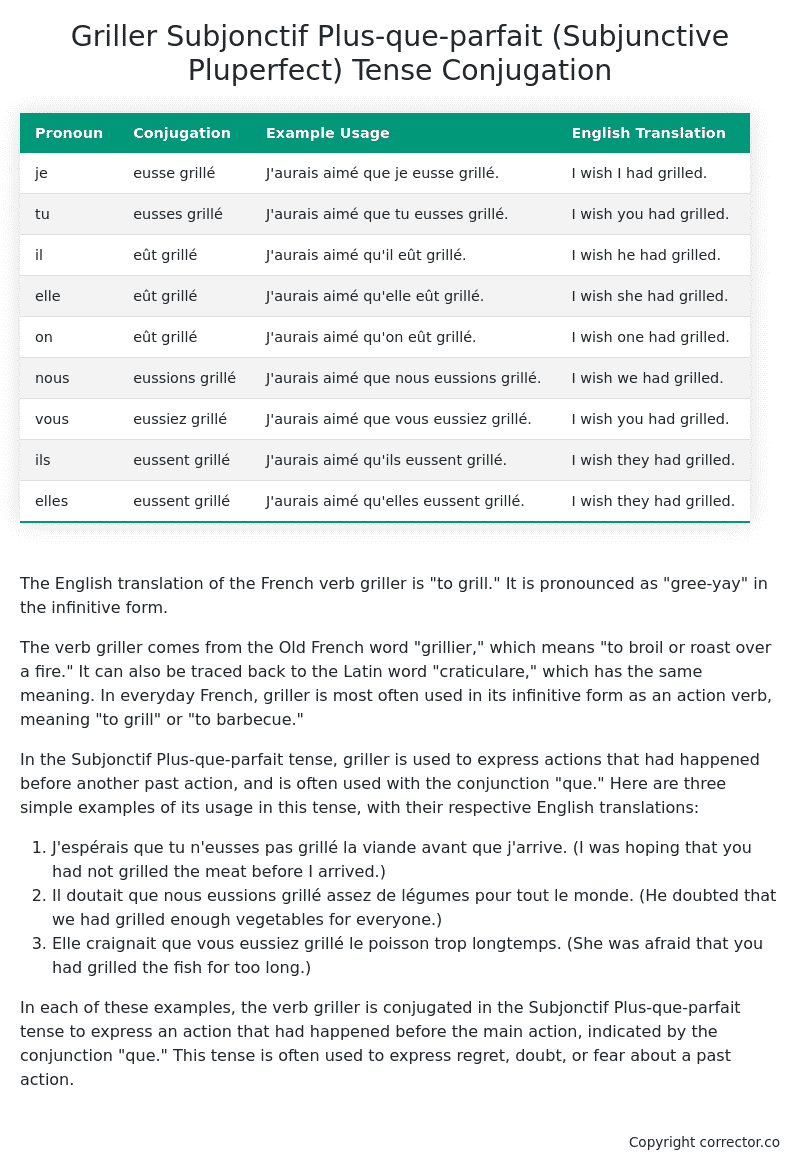Subjonctif Plus-que-parfait (Subjunctive Pluperfect) Tense Conjugation of the French Verb griller
Introduction to the verb griller
The English translation of the French verb griller is “to grill.” It is pronounced as “gree-yay” in the infinitive form.
The verb griller comes from the Old French word “grillier,” which means “to broil or roast over a fire.” It can also be traced back to the Latin word “craticulare,” which has the same meaning. In everyday French, griller is most often used in its infinitive form as an action verb, meaning “to grill” or “to barbecue.”
In the Subjonctif Plus-que-parfait tense, griller is used to express actions that had happened before another past action, and is often used with the conjunction “que.” Here are three simple examples of its usage in this tense, with their respective English translations:
- J’espérais que tu n’eusses pas grillé la viande avant que j’arrive. (I was hoping that you had not grilled the meat before I arrived.)
- Il doutait que nous eussions grillé assez de légumes pour tout le monde. (He doubted that we had grilled enough vegetables for everyone.)
- Elle craignait que vous eussiez grillé le poisson trop longtemps. (She was afraid that you had grilled the fish for too long.)
In each of these examples, the verb griller is conjugated in the Subjonctif Plus-que-parfait tense to express an action that had happened before the main action, indicated by the conjunction “que.” This tense is often used to express regret, doubt, or fear about a past action.
Table of the Subjonctif Plus-que-parfait (Subjunctive Pluperfect) Tense Conjugation of griller
| Pronoun | Conjugation | Example Usage | English Translation |
|---|---|---|---|
| je | eusse grillé | J’aurais aimé que je eusse grillé. | I wish I had grilled. |
| tu | eusses grillé | J’aurais aimé que tu eusses grillé. | I wish you had grilled. |
| il | eût grillé | J’aurais aimé qu’il eût grillé. | I wish he had grilled. |
| elle | eût grillé | J’aurais aimé qu’elle eût grillé. | I wish she had grilled. |
| on | eût grillé | J’aurais aimé qu’on eût grillé. | I wish one had grilled. |
| nous | eussions grillé | J’aurais aimé que nous eussions grillé. | I wish we had grilled. |
| vous | eussiez grillé | J’aurais aimé que vous eussiez grillé. | I wish you had grilled. |
| ils | eussent grillé | J’aurais aimé qu’ils eussent grillé. | I wish they had grilled. |
| elles | eussent grillé | J’aurais aimé qu’elles eussent grillé. | I wish they had grilled. |
Other Conjugations for Griller.
Le Present (Present Tense) Conjugation of the French Verb griller
Imparfait (Imperfect) Tense Conjugation of the French Verb griller
Passé Simple (Simple Past) Tense Conjugation of the French Verb griller
Passé Composé (Present Perfect) Tense Conjugation of the French Verb griller
Futur Simple (Simple Future) Tense Conjugation of the French Verb griller
Futur Proche (Near Future) Tense Conjugation of the French Verb griller
Plus-que-parfait (Pluperfect) Tense Conjugation of the French Verb griller
Passé Antérieur (Past Anterior) Tense Conjugation of the French Verb griller
Futur Antérieur (Future Anterior) Tense Conjugation of the French Verb griller
Subjonctif Présent (Subjunctive Present) Tense Conjugation of the French Verb griller
Subjonctif Passé (Subjunctive Past) Tense Conjugation of the French Verb griller
Subjonctif Imparfait (Subjunctive Imperfect) Tense Conjugation of the French Verb griller
Subjonctif Plus-que-parfait (Subjunctive Pluperfect) Tense Conjugation of the French Verb griller
Conditionnel Présent (Conditional Present) Tense Conjugation of the French Verb griller
Conditionnel Passé (Conditional Past) Tense Conjugation of the French Verb griller
L’impératif Présent (Imperative Present) Tense Conjugation of the French Verb griller
L’infinitif Présent (Infinitive Present) Tense Conjugation of the French Verb griller
(this article)
Struggling with French verbs or the language in general? Why not use our free French Grammar Checker – no registration required!
Get a FREE Download Study Sheet of this Conjugation 🔥
Simply right click the image below, click “save image” and get your free reference for the griller Subjonctif Plus-que-parfait tense conjugation!

Griller – About the French Subjonctif Plus-que-parfait (Subjunctive Pluperfect) Tense
Formation
Common Everyday Usage Patterns
Hypothetical Situations
Reported Speech
Doubt, Wishes, and Emotions
Interactions with Other Tenses
Present Subjunctive
Imperfect Subjunctive
Conditional
Summary
I hope you enjoyed this article on the verb griller. Still in a learning mood? Check out another TOTALLY random French verb conjugation!


